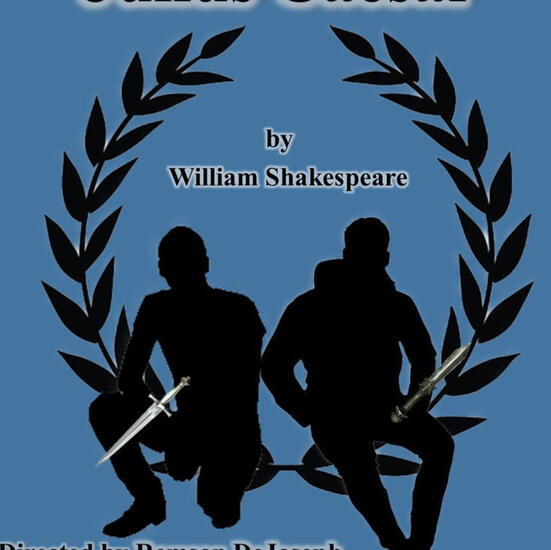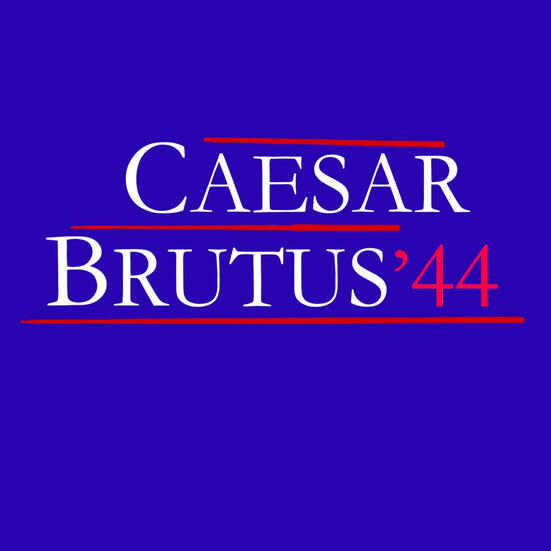South Shore Theatre Experience Presents:
Julius Caesar

"Friends...Romans...Countrymen..."
About the show
Julius Caesar has returned to Rome triumphant from the war against Pompey. The Roman republic is prepared to heap him with new honors, causing concern and dismay among some senators who fear that too much power is held by one man. A plot to overthrow Caesar commences, yet all involved are not united in their reason.One of Shakespeare’s most intricate political dramas, Julius Caesar asks the audience what becomes of politicians when they turn into icons? While history has answered this questions time and time again, Shakespeare provides a deeper insight into the corruption and ambivalence of politics.


Cast
Brittany DeAngelis as Portia/Cimber/Messala
Sam Everett as Julius Caesar/Strato
Peter Konsevitch as Caius Cassius
Matthew Lauri as Octavius/Trebonius
Aaron Liebowtiz as Lucius/Cinna
Joe Partain as Casca/Lepidus
Thaddeus Plezia as Marcus Brutus
Daniel Rock as Ligarius/Cinna the Poet/Titinius
Kim Tobin as Mark Antony/Calphurnia
----------------------------
Directed by Remson DeJoseph
Costumes and props by Deborah Plezia
Sound by Tavia Landry
Produced by South Shore Theatre Experience
"Bear with me. My heart is in the coffin there with Caesar, and I must pause till it come back to me."
Director's Note
Shakespeare’s Julius Caesar is odd. For one, the play is presented as a tragedy...which is normal for the history buffs who know Caesar will meet a tragic end at some point in the play. Shakespeare’s tragic titular characters usually meet their demise at the end (usually somewhere around act 5), take for instance Hamlet in Hamlet and Romeo and Juliet in Romeo and Juliet. Caesar, however, is killed at the beginning of act 3. Adding on to that, Caesar is only present in three of the eight scenes prior to his death. So Julius Caesar in Julius Caesar seems to be less of a focus. So who is? Brutus appears to have the most stage time and most lines of the show. Act 1 and 2 focus more on Brutus’s acceptance of overthrowing Caesar, while act 3, 4, and 5 explore the effects of this plan. A question that is good to ask is why does Shakespeare frame the play this way? Or better yet, what is happening when the play is framed like so?To me, the true tragedy lies in Brutus. A man honored by his people and country who falls into the pit trap of political corruption. Conventionally, Brutus and Caesar follow the tragic arc: a well-beloved man with high social status is doomed to failure by his own flaws, and must pay for them through death. The difference between Brutus and Caesar is that there is an obvious change to Brutus throughout the play, from honorable to authoritarian, while Caesar remains pompous and tyrannical before his death. Brutus becomes more like Caesar as the play progresses.Of course, setting Brutus as the tragic character isn’t the sole purpose of the play. Caesar, quite literally, haunts the play after his death. His biggest supporter, Mark Antony, glorifies Caesar as a hero of Rome at his funeral, and gets a crowd of Plebeians, just on their knees for Brutus, to call for a mutiny to end Brutus’s newly found reign. It is this famous scene, where the line “Friends, Romans, countrymen, lend me your ears” comes into play, that becomes the turning point of the text. Julius Caesar is about turning politicians into icons, and the effects it has over a people and country. All of a sudden a mob trots through Rome hunting not only conspirators but anyone who looks associated with Brutus. It is a scary reality that plagues politics over and over again in real time.Setting the show in the 80s comes out of idolizing politicians. President Reagan came to mind, a president whose iconography lasts even today. Although our show doesn't present Caesar wholly as Reagan and Rome wholly in the 80s. The show is given this 80s aesthetic to aid the narrative. In truth, our production is set in a timeless limbo that goes from the 80s to 44 BC, to the present, to the 1940s. It is one thing, but it is also the opposite, much like how Caesar is loved and yet hated in a blink of an eye. Julius Caesar highlights the ambivalence of politics and the corruption of power, yet mirrors modernity too well. As the show ends, we are left wondering, "who was in the right?" Was it Brutus? Was it Antony? Was it Caesar all along? The text never clears it up totally, but maybe you'll be able to answer it yourself.We hope you enjoy our performance of Julius Caesar!
- Remson DeJoseph
A Note from the Theatre
A special thanks to:
- Tavia Landry for the killer sound cues
- Deborah Plezia for the props, costumes, rehearsal space, and the opportunity to perform this piece
- My parents for letting us use their backyard for the entire summer.
- My sister for helping line calls
- Rosie Collette for her perspective and help with other aspects of the show!
- The entire cast for their creative input and extraordinary talent with putting this work onto the stage, as well as their patience with my process.
- My friends from home, Rhode Island, and Boston for their continual support in my creative endeavors.
- the town of Babylon and Lindenhurst for giving us the space to perform our piece